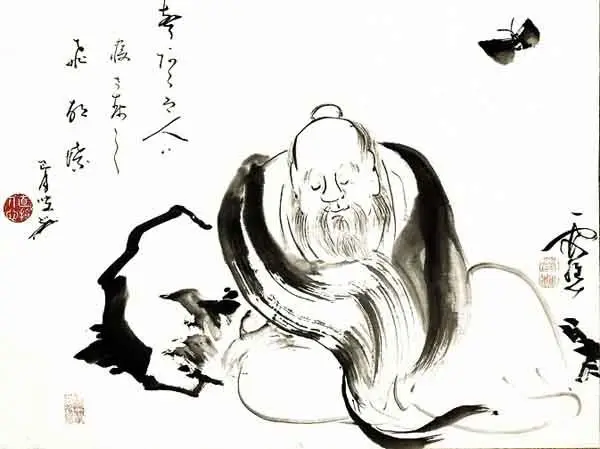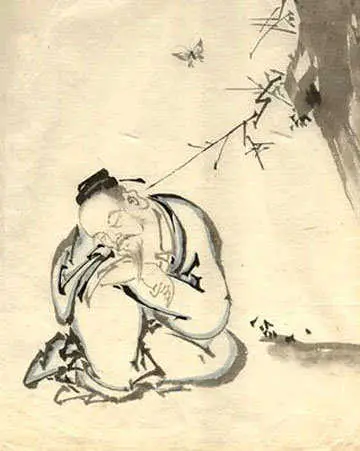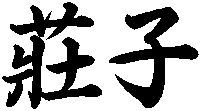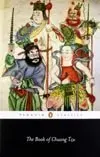|
Tao Te Ching
THE TAOISM OF LAO TZU
|
Chuang Tzu 16 The Taoist Text, Chapter 16
Correcting the Nature.1. Those who would correct their nature by means of the vulgar learning, seeking to restore it to its original condition, and those who would regulate their desires, by the vulgar ways of thinking, seeking thereby to carry their intelligence to perfection, must be pronounced to be deluded and ignorant people. The ancients who regulated the Tâo nourished their faculty of knowledge by their placidity, and all through life abstained from employing that faculty in action;- they must be pronounced to have (thus also) nourished their placidity by their knowledge.
When the faculty of knowledge and the placidity (thus) blend together, and they nourish each other, then from the nature there come forth harmony and orderly method. The attributes (of the Tâo) constitute the harmony; the Tâo (itself) secures the orderly method. When the attributes appear in a universal practice of forbearance, we have Benevolence; when the path is all marked by orderly method, we have Righteousness; when the righteousness is clearly manifested, and (all) things are regarded with affection, we have Leal-heartedness; when the (heart's) core is thus (pure) and real, and carried back to its (proper) qualities, we have Music; when this sincerity appears in all the range of the capacity, and its demonstrations are in accordance with what is elegant, we have Ceremony. If ceremonies and Music are carried out in an imperfect and one-sided manner, the world is thrown into confusion. When men would rectify others, and their own virtue is beclouded, it is not sufficient to extend itself to them. If an attempt be made so to extend it, they also will lose their (proper) nature.
This condition (of excellence) deteriorated and decayed, till Sui-zan and Fû-hsì arose and commenced their administration of the world; on which came a compliance (with their methods), but the state of unity was lost. The condition going on to deteriorate and decay, Shan Nang and Hwang-Tì arose, and took the administration of the world, on which (the people) rested (in their methods), but did not themselves comply with them. Still the deterioration and decay continued till the lords of Thang and Yü began to administer the world. These introduced the method of governing by transformation, resorting to the stream (instead of to the spring), thus vitiating the purity and destroying the simplicity (of the nature). They left the Tâo, and substituted the Good for it, and pursued the course of Haphazard Virtue. After this they forsook their nature and followed (the promptings of) their minds. One mind and another associated their knowledge, but were unable to give rest to the world. Then they added to this knowledge (external and) elegant forms, and went on to make these more and more numerous. The forms extinguished the (primal) simplicity, till the mind was drowned by their multiplicity. After this the people began to be perplexed and disordered, and had no way by which they might return to their true nature, and bring back their original condition.
Those whom the ancients called "Retired Scholars" did not conceal their persons, and not allow themselves to be seen; they did not shut up their words, and refuse to give utterance to them; they did not hide away their knowledge, and refuse to bring it forth. The conditions laid on them by the times were very much awry. If the conditions of the times had allowed them to act in the world on a great scale, they would have brought back the state of unity without any trace being perceived (of how they did so), When those conditions shut them up entirely from such action, they struck their roots deeper (in themselves), were perfectly still and waited. It was thus that they preserved (the Way in) their own persons.
What was anciently called "the Attainment of the Aim" did not mean the getting of carriages and coronets; it simply meant that nothing more was needed for their enjoyment. Now-a-days what is called "the Attainment of the Aim" means the getting of carriages and coronets. But carriages and coronets belong to the body; they do not affect the nature as it is constituted. When such things happen to come, it is but for a time; being but for a time, their coming cannot be obstructed and their going cannot be stopped. Therefore we should not because of carriages and coronets indulge our aims, nor because of distress and straitness resort to the vulgar (learning and thinking); the one of these conditions and the other may equally conduce to our enjoyment, which is simply to be free from anxiety. If now the departure of what is transient takes away one's enjoyment, this view shows that what enjoyment it had given was worthless. Hence it is said, "They who lose themselves in their pursuit of things, and lose their nature in their study of what is vulgar, must be pronounced people who turn things upside down." 
Chuang Tzu
 The Book of Chuang TzuA modern translation of Chuang Tzu, by Martin Palmer and Elizabeth Breuilly.See the book at Amazon
About CookiesMy Other Websites:I Ching OnlineThe 64 hexagrams of the Chinese classic I Ching and what they mean in divination. Try it online for free.
Qi Energy ExercisesThe ancient Chinese life energy qi (chi) explained, with simple instructions on how to exercise it.
Life EnergyThe many ancient and modern life force beliefs all over the world explained and compared.
Taoismen på svenska
Other Books by Stefan StenuddClick the image to see the book at Amazon (paid link).
The Greek philosophers and what they thought about cosmology, myth, and the gods. |
 Tao Te Ching
Tao Te Ching Tao Quotes
Tao Quotes Fake Lao Tzu Quotes
Fake Lao Tzu Quotes Cosmos of the Ancients
Cosmos of the Ancients Qi — Increase Your Life Energy
Qi — Increase Your Life Energy Aikido Principles
Aikido Principles Life Energy Encyclopedia
Life Energy Encyclopedia Archetypes of Mythology
Archetypes of Mythology Stefan Stenudd
Stefan Stenudd